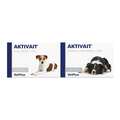Firework season is just around the corner, which is an anxiety-inducing time for many pets across the UK, including their owners.
The loud bangs, shrieks and bright lights can be upsetting for animals who have no understanding of what they are or why they are happening, and naturally assume they pose a real danger. Cats and dogs can show signs of stress in many ways, including panting, pacing, trembling, hypersalivating, hiding and excessively vocalising.
If you suspect your pet suffers from firework fear, you should first of all speak to your vet. They may want to carry out tests to check your pet is otherwise healthy, before suggesting ways you can help.
- Remain calm – the best way of showing your pet there is nothing to be afraid of is by staying calm yourself. Cats and dogs will pick up on changes to your body language and tone of voice, so if you act like nothing is wrong, your pet will eventually learn to settle down.
- Keep petting to a minimum – while it is fine to comfort and reassure your animal if they come to you in fear, try not to overdo it, as your pet will interpret this as confirmation of the perceived threat.
- Create a safe space or ‘den’ – if your pet is fearful of fireworks, give them somewhere to go when things get a bit much and they want to hide. Your pet may already have somewhere like a bed or crate but, if not, create somewhere cosy and quiet, preferably in a room that isn’t going to be disturbed too often, and draw all the curtains to shut out the sounds.
- Soundproof your home – as well as drawing the curtains and closing the doors, turn on the TV or radio to provide a welcome distraction and a sense of normality for your pet. It can sometimes be helpful to play a firework soundtrack in the lead-up to firework season to familiarise your pet with and desensitise them to the different sounds.
- Give a calming supplement – calming products can be given in the lead-up to or on the day of a scheduled firework display, to help promote feelings of calm and reduce stress-related behaviours. Calmers can be given in the form of tablets, chews, or diffusers that go in the room your pet spends most of its time. Special calming vests or Thunder Shirts can also be purchased which work by applying pressure all over the body. SettleMe new and improved chews contain a blend of ingredients believed to be helpful in reducing anxiety and over-activity and are ideal for both short and long-term use in cats and dogs.
- Exercise early – try to go out for a long walk in the afternoon before a scheduled display to give your dog plenty of chance to stretch its legs and use up its energy. This will ensure they are calm and sleepy in the evening when you get back home.
For extreme cases of firework fear, your vet may need to prescribe a mild sedative to relax your pet, but this is something you’d need to discuss with them. Most cases can be worked through just by you remaining calm and showing your pet that you’re not afraid, so neither should they be.
Written by: Hannah










